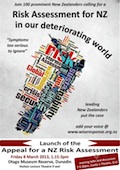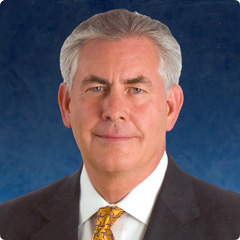 A loose affiliation of New Zealand’s great and good will launch an appeal to parliament next week, asking for a dispassionate and non-partisan risk assessment of the “unprecedented threats to our collective security” facing the country as a result of climate change, fossil fuel extraction and economic uncertainty. The Wise Response group features poets, writers, All Blacks, academics, surgeons and scientists amongst its first 100 supporters ((The Otago Daily Times lists Brian Turner, Wayne Smith, Fiona Kidman, Glenn Turner, David Thom, Philip Temple, Anne Salmond, Julian Dean, Owen Marshall, Morgan Williams, Chris Trotter, Bruce Burns, Richard Langston and Anton Oliver amongst others.)), and will launch its appeal at a public meeting in Dunedin on March 8th.
A loose affiliation of New Zealand’s great and good will launch an appeal to parliament next week, asking for a dispassionate and non-partisan risk assessment of the “unprecedented threats to our collective security” facing the country as a result of climate change, fossil fuel extraction and economic uncertainty. The Wise Response group features poets, writers, All Blacks, academics, surgeons and scientists amongst its first 100 supporters ((The Otago Daily Times lists Brian Turner, Wayne Smith, Fiona Kidman, Glenn Turner, David Thom, Philip Temple, Anne Salmond, Julian Dean, Owen Marshall, Morgan Williams, Chris Trotter, Bruce Burns, Richard Langston and Anton Oliver amongst others.)), and will launch its appeal at a public meeting in Dunedin on March 8th.
In its appeal the group identifies critical risks in five areas:
Continue reading “Symptoms too serious to ignore: a call to face up to NZ’s critical risks”

 “It has become a rogue industry, reckless like no other force on Earth. It is Public Enemy Number One to the survival of our planetary civilization.” These are the words Bill McKibben uses to describe the fossil-fuel industry in a recent
“It has become a rogue industry, reckless like no other force on Earth. It is Public Enemy Number One to the survival of our planetary civilization.” These are the words Bill McKibben uses to describe the fossil-fuel industry in a recent 
 One wearies of lamenting the government’s inability to view proposed paths of economic development from the perspective of climate change. But as they continue to trumpet economic solutions which are inimical to facing the challenge of global warming there is little option but to keep reiterating that they need to take a longer term view.
One wearies of lamenting the government’s inability to view proposed paths of economic development from the perspective of climate change. But as they continue to trumpet economic solutions which are inimical to facing the challenge of global warming there is little option but to keep reiterating that they need to take a longer term view.
 I sometimes wonder what the CEOs of fossil fuel companies think about the effect of their products on the atmosphere and whether they harbour any anxieties about climate change. One of them, Rex Tillerson of ExxonMobil, has told us how he views the matter in his reply to a question
I sometimes wonder what the CEOs of fossil fuel companies think about the effect of their products on the atmosphere and whether they harbour any anxieties about climate change. One of them, Rex Tillerson of ExxonMobil, has told us how he views the matter in his reply to a question